
Circuit Training 144: The most Robin Ince time of the year
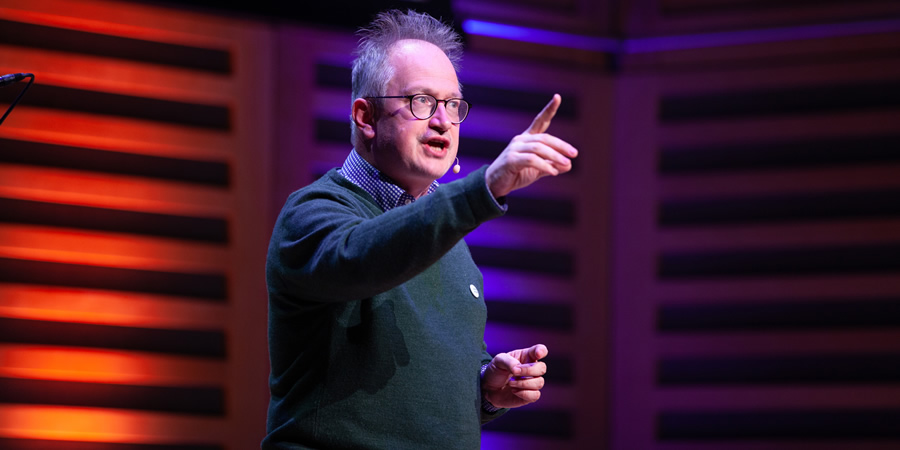
As we've probably said during previous Decembers: Christmas is Robin time. Ince, that is, who is pushing the festive envelope this year. First up, there's his mighty show with Brian Cox at the Royal Albert Hall on Tuesday the 14th, the Christmas Compendium of Reason, an epic avalanche of entertainment and enlightenment supporting umpteen good causes, with a Santa-like secret list of guests. Everyone from Duran Duran to Hugh Grant have appeared, in Christmases past.
Meanwhile he's also aiming for classy stockings, with a terrifically engaging new book, The Importance of Being Interested, in which The Infinite Monkey Cage co-host (aided by lots of interviewees) explores his belated love of science. Like yours truly, Ince was uninspired by those lessons at school in Hertfordshire; but as we discuss below, that usually isn't the teachers' fault.
And he's also back with four editions of Nine Lessons and Carols for Curious People, with - yes! - loads of cool and clever guests. But this particular lunchtime he's with Circuit Training, in a café in Herts, appropriately enough, breaking off from his 100 bookshops tour to eat cake and talk turkey. Let's start big, at the Albert Hall.
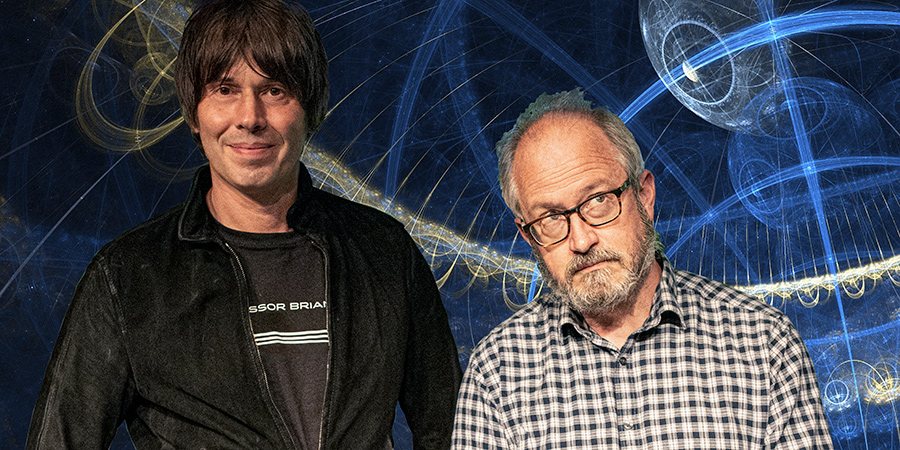
This year's Christmas Compendium - any cryptic hints about the content?
We never let on who is going to be appearing on the show which adds to the excitement of it all. We've always been so fortunate to get such amazing guests in the past - New Order, Jo Brand, Sophie Ellis-Bextor, Hugh Grant, Eddie Izzard, Dara O Briain, Duran Duran, Alice Roberts, Jim Al-Khalili, Carolyn Porco.
This year promises to be just as exciting and I'm looking forward to introducing them all.
Do you have different warm-up regimes before that big show, given your wildly different energy levels?
Brian and I have known each other for so long that it just seems to work somehow. I think we've become really good foils for each other and our banter just seems to flow naturally even when we overrun. Which we always do!
It's an ideal combo. Much as the wife and I love Brian's TV shows, I must admit, we do occasionally nod off. He's on after dinner, and that voice is so soothing...
People sometimes say, 'you know what, I don't want to sound terrible, but quite often I go to bed and sleep listening to Monkey Cage.' And it's clearly during Brian's beautiful lullabies: even when he's talking about the death of the universe, it gently wafts you into oblivion doesn't it?
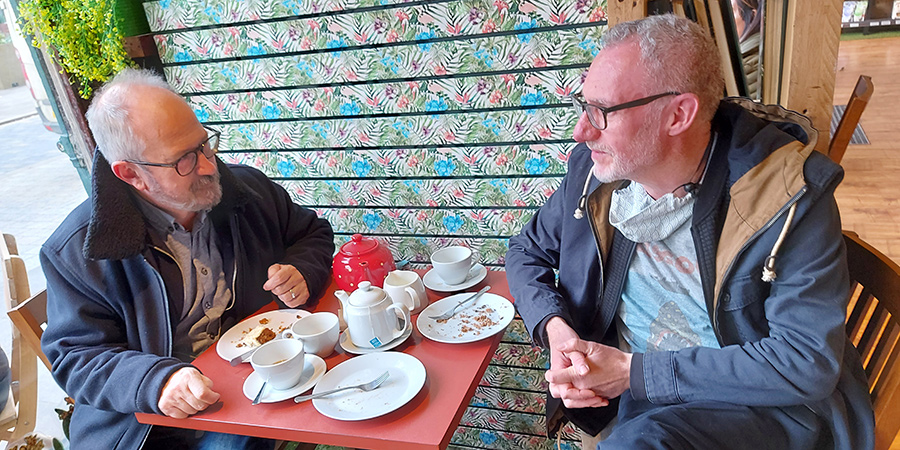
Whereas you talk very quickly and fit lots of words in...
Yeah, that's for sure. But that's one of the reasons why he's wooed people into science as well, he is this gentle storyteller; not always in the content, but with the tone. It doesn't feel threatening. And also because he looks like he does.
It's a joke that we've always had, that I look like the scientist and he doesn't; I'm in the poor quality knitwear. Although we've got some exciting ideas for cardigans for the new tour. At one point I was going to get a really snappy suit, but I don't think that works, so I'm thinking exuberant cardigans with maybe [Richard] Feynman diagrams on it, one with various black holes...
You could start a merch line: a whole knitwear empire.
Edinburgh Woollen Mill has shut down, I'm ready to take up those places.
I think also, with Brian's solo shows, our brains sometimes just get full...
There was something I said to him years ago, I was sat in front of a lecture - I'd done the introduction - and then he suddenly turned to me and said, 'what's the answer to that Robin?' And I said, 'I don't know, I'm not at the stage you're up to; three minutes ago you were talking about that idea and I'm just thinking about that.'
And that's what proper lectures actually really need: 12 minutes, and then everyone has their head on the desk for a bit. That's definitely what reading science should be, you should read a science book slowly. And stop a lot. It's a slow process.
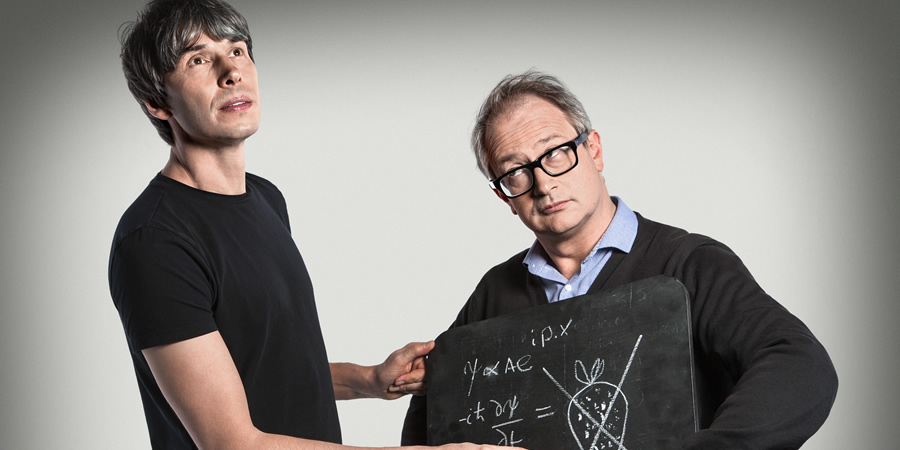
You mention in your new book that school science lessons were a turn off - I went to school round here too, and had the same issue.
It's just abstract, that's why. Science is taught in a way that is abstract. Which is not the fault of teachers, it's the way the curriculum's set up.
Is it still the same now?
Yeah, it's a real battle. I speak to teachers, and they say, 'Oh God, GCSE this term, I just have to make sure they memorise these equations.' To me, equations, they're disconnected from how the idea came up, from the daydreaming, from the failure, all of those different things.
Very often, scientific adventures begin from a transcendent moment, to be lost in something beautiful or strange. But very often we're taught that it's just someone who went, 'how does that work?' And the emotional attachment to the idea is removed.
Most people I know, who have not become scientists, have had that experience: most of them did not feel that they have a scientific mind.
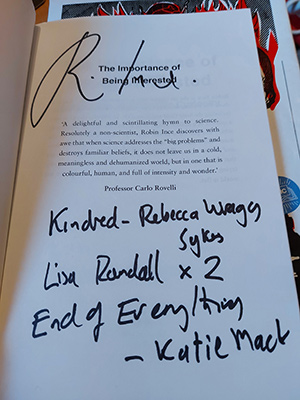
So should we be humanising the great thinkers more?
We don't even need to worry about the great thinkers, because we need to look at the culture as a whole; the ideas that underpin a society. It's about the stories. It's the same with arguments about climate change, you have to tell the story; the statistics and the graphs are not enough.
It's really interesting. In Farnham, there were loads of Tim Minchin fans - Minchkins as they're called - I did a thing with Tim when the book was launched online. All of them were like, 'ah I'm not clever enough for science, but I really enjoyed hearing about all this.' It's not about how clever you are. It's about whether you can open your mind enough to then face up to the realisation that there's huge things that we don't know.
It takes a certain level of confidence to admit to not knowing.
In quite an early talk, someone came up afterwards and said, "thank you very much for saying 'I don't know."' Someone had asked me a question, and I said, 'I'm not the person to ask that, these are the places I would really recommend you going.' I do that quite often, and it's interesting that people should consider that anything of note.
Because a lot of people feel obliged to have an opinion anyway...
That would make Question Time a much better show, if the presenter would say, 'Why do you say that? Where does that come from?' But they don't, which is why I never did those shows. I used to get asked, but I knew that I wouldn't be very good; I'd get overly cross. Which would probably have a certain level of spectacle.
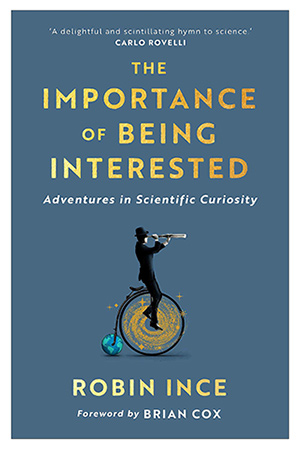
How did you find writing this book? Doing the previous one sounded like bloody torture.
It was much easier to write than the last one. Fitting in everything I wanted to was really hard. I hated it when I did the talking book, but then I found that loads of people hate that, because all you can see are the errors, things you want to change.
Now I'm happy with it. When I was down in Totnes, someone had bought the book for their 93 year-old dad, 'every night I read a bit of it' That's exactly what I wanted; 10, 11 year-olds to a 93 year-old. And I wanted to introduce loads of ideas, not too deeply, just enough so that they can then go 'I'm going to find out more about that'. I get a lot of people saying 'this has proven to be a very expensive book,' because they've made a list of all the other books they're going to read now.
So I see it as that, like a first book back to science. I've had scientists say: 'I forget why I do science sometimes, and because you're excitable about it, that reminds me of when I was 19'. So I like that it works for both. I think that's how Monkey Cage works as well, a lot of the scientists who like it are going 'oh, that is a fun subject after all.'
Scientists are being demonised these days, with climate change, and you talk in the book about the vaccine controversies.
So originally, I wasn't going to put it in, but I felt I had to. We've always had conspiracy theorists, they've always been 8, 9, 10 percent of people. And the trouble is whether you need to argue with them or not. A lot of time is wasted arguing with someone, where all you should do is say, 'I recommend you read this article.' And that's all you need. Don't start arguing with that person, just put up a counter argument.
I remember Andrew O'Neill doing a good bit about how broadcasting 'balance' now involves a sensible expert here, and an absolute lunatic over here.
There's a problem with broadcasters, which is that a lot of people in charge don't like science. I think a lot of the battle with science is also a battle of pomposity, and not within science but within people who just go 'well, I think it's rather unfair that someone calls themselves an expert just because they spent 30 years studying it...' News journalism is packed with it, all those economists who write stuff about the vaccine without any proper understanding.
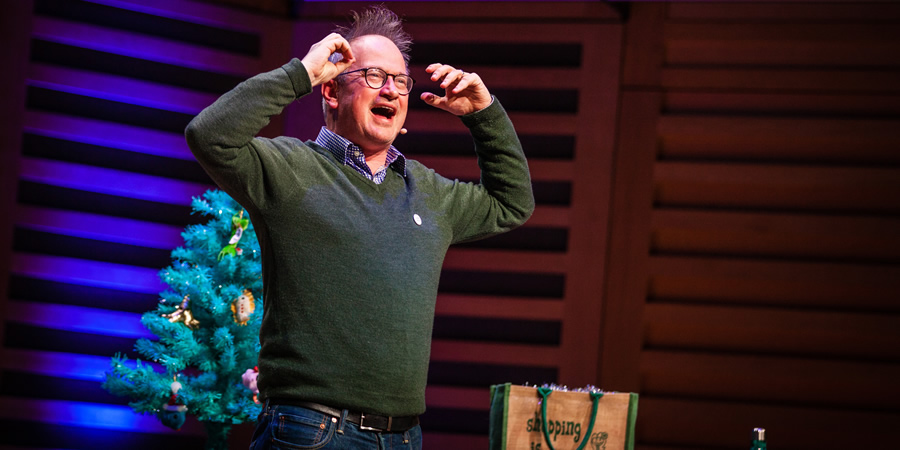
You're also back doing Nine Lessons this Christmas, after last year's 24-hour online version.
Yeah, 25 hours, which was so much fun to do. Poor Trent [Burton, who co-runs the Cosmic Shambles Network], who basically had not been out of his house for nine months, walked down the first step and broke his foot. And of course, he didn't know it was broken, but basically he's hobbling around at three in the morning.
There's something really lovely about that as well: at about 2.15am we went down for about half an hour. And what was beautiful was all of the people who were watching it just started talking to each other: 'oh, are you interested in that idea? Right...' All around the world. The importance of connection.
Your lockdown shows felt like a real lifeline for people too, as they were always there, every morning.
It was so much fun, with Josie [Long] and Trent, and again you realise the importance of what entertainment can be. I like the fact that a few people on this tour said to me, 'you're the only people that I'm quite happy to go and watch on my own.' Because sometimes people say 'I can't find a friend to come and see the show' and I say: the people who come to the shows I do, they're really nice people, and they come once on their own and they're absolutely fine, and some of them become friends, then certain groups kind of get together.
I imagine that's partly because your shows are useful too, where going to go see a straight comedy show on your own can feel odd.
I think one of the problems with comedy is, people are told that funny is funny. But actually we don't go 'you like music, you'll love this.' If you don't really like heavy metal, you're not necessarily going to like a really great heavy metal album. You know, there are some people who hate Stewart Lee, and I thought that his last show was the funniest two hours...
If you see a lot of comedy, you find yourself laughing at totally different things to the rest of the audience too. Comics in an audience laugh at all sorts of weird bits.
I remember my mate Gavin Webster; I hadn't seen Gav for ages, I think he's brilliant. He came to see one of my Edinburgh shows about seven or eight years ago, and I think he imagined that I now was this 'wry take on science, very clever, very clever.' And then he saw that I still just do loads of silly voices and jumping up and down. And he went, "Oh, I didn't realise, you're still the idiot you always were."
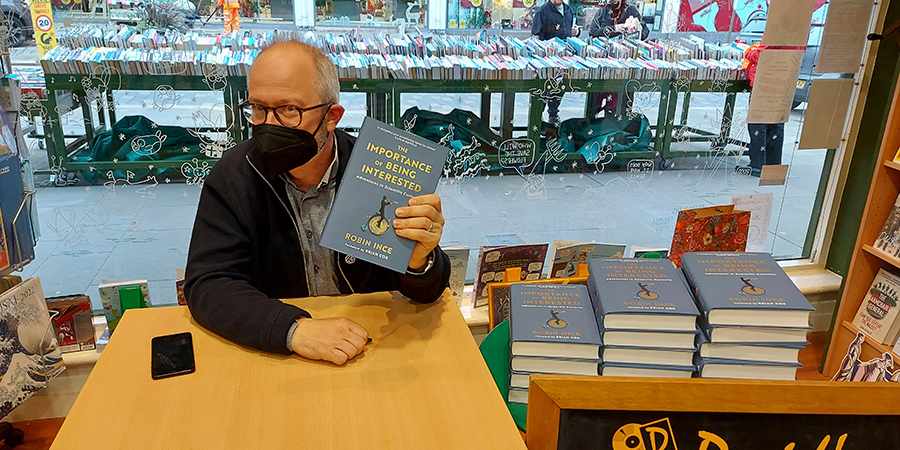
So how many books have you bought, on this 100 bookshop tour, so far?
Oh, hundreds.
And how are you feeling about the tour, this far in?
I'm falling apart now. I am falling apart, but I'm alright. The first thing I did before I met you was buy three different forms of paracetamol... but I'm fine.
Nine Lessons and Carols for Curious People runs till 18th December. Info & Tickets
Robin's book, The Importance of Being Interested, is available now
Help us publish more great content by becoming a BCG Supporter. You'll be backing our mission to champion, celebrate and promote British comedy in all its forms: past, present and future.
We understand times are tough, but if you believe in the power of laughter we'd be honoured to have you join us. Advertising doesn't cover our costs, so every single donation matters and is put to good use. Thank you.
Love comedy? Find out more